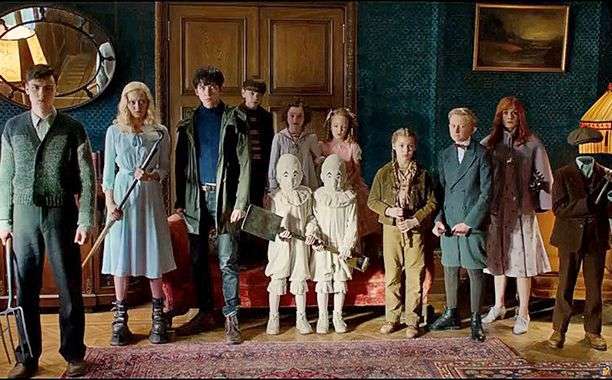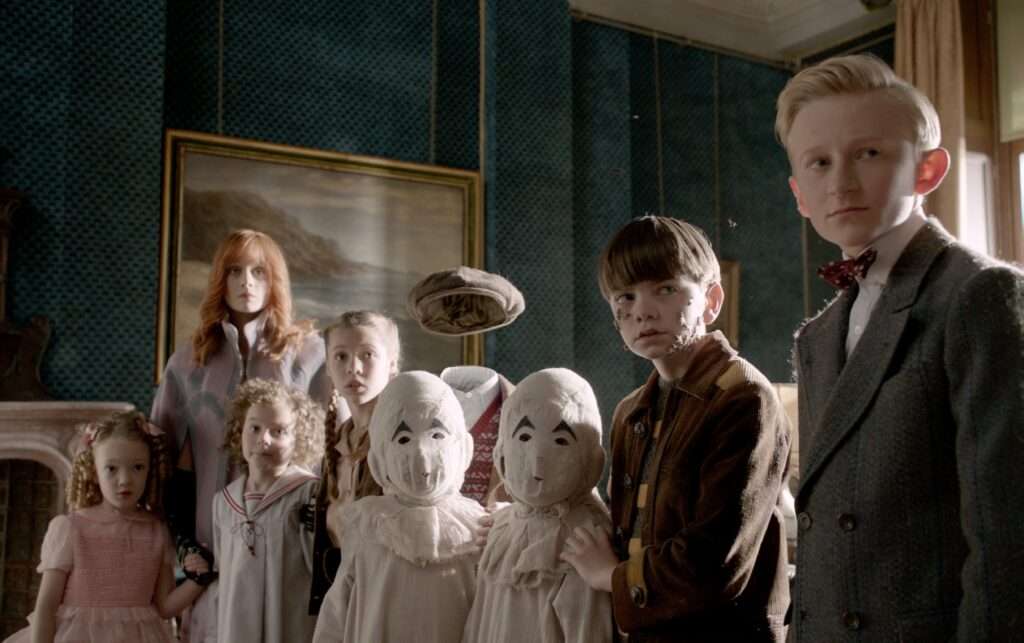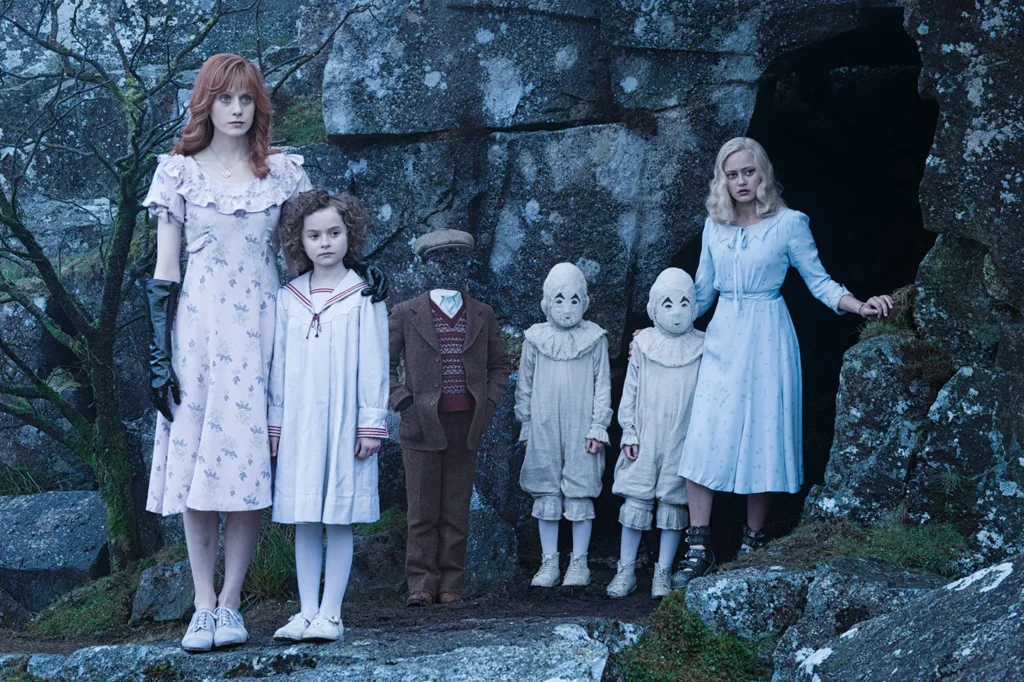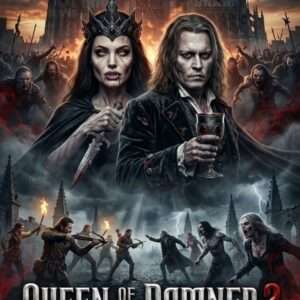Tim Burton’s Miss Peregrine’s Home for Peculiar Children (2016) is a visually stunning yet flawed adaptation of Ransom Riggs’ beloved novel. With its signature Burtonesque style, the film delivers a dark, whimsical aesthetic, unique characters, and a mysterious atmosphere. However, despite its artistic strengths, it falls short in narrative coherence, pacing, and emotional depth, making it an uneven cinematic experience.
Visuals and Aesthetic
As expected from a Tim Burton film, Miss Peregrine’s Home for Peculiar Children is a feast for the eyes. The director’s signature gothic style, combined with fantastical elements, creates a mesmerizing visual landscape. The peculiar children and their abilities are brought to life with impressive special effects, from Emma Bloom (Ella Purnell) floating effortlessly to Millard’s (Cameron King) invisible antics. The cinematography, handled by Bruno Delbonnel, enhances the film’s dreamlike atmosphere, particularly in the scenes set in the 1943 time loop.

The design of Miss Peregrine’s home itself is breathtaking. The grand, Victorian-inspired mansion is both eerie and inviting, reflecting the dual nature of the peculiar world—one of wonder and danger. The creature designs, particularly the Hollowgasts, are effectively nightmarish, resembling elongated, faceless monsters reminiscent of classic Burton horror elements. This attention to detail in production design reinforces the immersive quality of the film.
Characterization and Performances
Eva Green shines as Miss Alma Peregrine, the enigmatic caretaker of the peculiar children. She embodies the role with an air of sophistication, authority, and charm, making her one of the film’s highlights. Green’s performance adds an element of intrigue and charisma, elevating the character beyond what was written in the script.
As the protagonist, Asa Butterfield delivers a decent yet underwhelming performance as Jake Portman. While he captures Jake’s initial awkwardness and sense of alienation, his emotional range feels somewhat limited, especially when compared to the more vibrant characters surrounding him. His chemistry with Emma Bloom (Ella Purnell) feels forced at times, lacking the depth needed to make their relationship truly compelling.
Samuel L. Jackson plays the villainous Barron, a character who does not appear in the book but was created for the film adaptation. While Jackson injects energy and humor into the role, his over-the-top portrayal feels out of place in Burton’s otherwise somber and atmospheric world. The character’s exaggerated mannerisms and comedic elements diminish the stakes of the story, making him more of a caricature than a menacing antagonist.
Narrative Structure and Pacing
One of the film’s most significant flaws lies in its storytelling. While the book unfolds as a compelling mystery, gradually revealing the peculiar world, the film rushes through important plot points, sacrificing depth for spectacle. The first act, which establishes Jake’s journey from an ordinary teenager to a discoverer of the peculiar world, feels disjointed. The transition between his mundane life and the extraordinary world of Miss Peregrine’s home lacks the necessary buildup, making it difficult for the audience to fully invest in his transformation.
Additionally, the film’s pacing is inconsistent. Some scenes feel unnecessarily prolonged, while others, particularly those involving key revelations, are rushed. The climactic battle in Blackpool, where the peculiar children face off against the Hollows and Barron, shifts the tone dramatically from eerie fantasy to action-comedy, undermining the darker themes established earlier. This tonal inconsistency makes it challenging to take the story seriously by the film’s conclusion.
Deviations from the Source Material
As an adaptation, Miss Peregrine’s Home for Peculiar Children makes significant departures from Ransom Riggs’ novel, some of which hinder the film’s effectiveness. One of the most controversial changes is the swap between Emma and Olive’s abilities. In the book, Emma has the power to create fire, while Olive is the one who floats. The film inexplicably reverses these roles, a decision that serves no apparent purpose and may alienate fans of the book.

Additionally, the film alters the climax, introducing a battle sequence in Blackpool that does not exist in the novel. While the book ends on a more somber and uncertain note, setting up the sequels, the film opts for a more conclusive resolution, eliminating much of the emotional weight and ambiguity. These changes simplify the story, making it more of a conventional fantasy adventure rather than the complex, eerie tale that made the book so compelling.
Themes and Missed Opportunities
At its core, Miss Peregrine’s Home for Peculiar Children explores themes of belonging, identity, and self-discovery. Jake’s journey mirrors the classic coming-of-age narrative, as he learns to embrace his own peculiar abilities and finds a place where he truly belongs. However, the film fails to explore these themes with the same depth as the novel.
One of the most intriguing aspects of Riggs’ book is its use of vintage photographs to create an eerie, almost documentary-like quality. This element is largely absent from the film, which relies more on visual effects and spectacle than the haunting, nostalgic atmosphere that made the novel unique. By neglecting this stylistic choice, the film misses an opportunity to enhance its mystery and emotional resonance.
Furthermore, the film barely scratches the surface of the more mature and somber themes present in the novel. The idea of being trapped in a time loop, reliving the same day over and over again, carries significant emotional weight, yet the film does not delve deeply into the psychological toll this might take on the peculiar children. Instead, it treats the concept more as a plot device than an element of existential reflection.
Conclusion
Tim Burton’s Miss Peregrine’s Home for Peculiar Children is an ambitious adaptation that excels in visual storytelling but falters in narrative execution. While the film’s aesthetics, creature designs, and Eva Green’s performance are commendable, its uneven pacing, weak character development, and unnecessary departures from the source material prevent it from reaching its full potential.

For fans of Burton’s style and gothic fantasy, the film offers enough visual appeal to be worth watching. However, those seeking a faithful and emotionally rich adaptation of Ransom Riggs’ novel may find themselves disappointed. Ultimately, Miss Peregrine’s Home for Peculiar Children is a film that, much like its peculiar characters, possesses unique charm but struggles to find its true place in cinematic storytelling.





